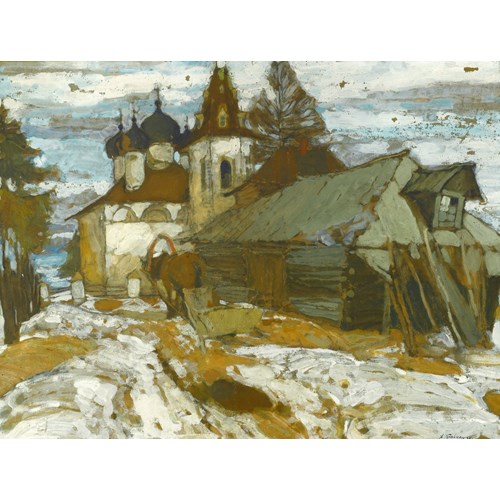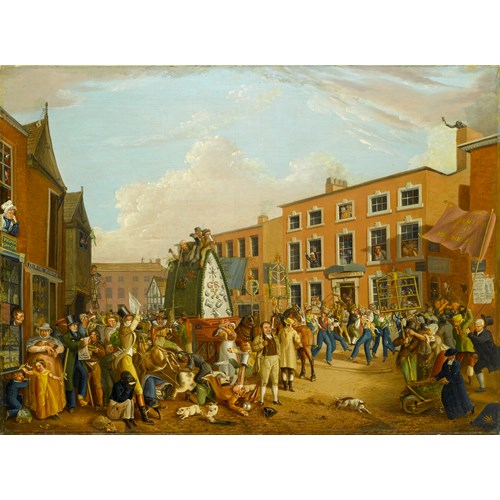Marketplace
On the Shore of the Hudson
Sergei Sudeikin
On the Shore of the Hudson
Epoque 20th century
Origine Russia
Medium Oil on canvas
Dimension 56 x 66 cm (22 x 26 inches)
The present work was executed by Sergei Sudeikin during the last period of his career, when the artist lived in the United States. Following years spent in Russia and Europe, working on stage designs and theatrical themes, Sudeikin was looking for new subjects and found inspiration in the everyday life of Americans.
Lawrence Sullivan writes about the artist’s life in the States: ‘During the depression of the 1930s, Sudeikin, living in the art colony of Woodstock, New York, cultivated an American accent in his style of painting, focusing on landscapes, rural figures, and black Americans.’¹
Sudeikin was particularly fascinated by archetypes of African- American society of that time, depicting scenes from blues-cafes and bars in The Cotton Club, Harlem, (Private Collection), everyday life of peasant people in American Panorama, (Private collection)² or leisure scenes such as On the Shore of the Hudson. While depicting the leisure time of ordinary black Americans during a summer’s day, Sudeikin tried to explore new characters, studying people and faces, archetypes that were unknown to him in previous years. Totally immersing himself into this study, Sudeikin still used one of his favourite subjects, of elegantly dressed couples on a promenade, which he had often used in the past. Two similar Russian period canvases are the Russian Museum’s Park, and the Tretyakov Gallery’s Indian Summer, and both can be compared to On the Shore of the Hudson.
The depicted landscape is probably Nyack Beach State Park or Hook Mountain Park near Nyack, New York where the artist lived and spent the last decades of his life. These parks, on the banks of the River Hudson, were very popular with both local residents and visitors who came upriver from New York City, to enjoy the clean air, beaches and facilities. Much of this was constructed by the Civilian Conservation Corps during the Great Depression.
Sudeikin later returned to stage design, and his best known work for the musical theater at this time was George Gershwin’s folk opera Porgy and Bess, produced in 1935, as well as many others. In the late 1930s and early 1940s Sudeikin continued to design for the ballet and for an unsuccessful revival of the Chauve-Souris in 1943. In 1946, Sergey Sudeikin developed a severe heart condition, and spent his last days at the Tolstoy Foundation Reed Farm, to pass away on the 12th August.
On the Shore of Hudson is a rare example of artist’s work from a special period, when he was searching for inspiration in scenes of rural life and archetypes of black Americans. Paintings such as the present one demonstrate Sudeikin applying the unique style he had developed during his time in Russian and Europe, to the fresh and exciting new subject matter he encountered in America.
¹ Sullivan, L., ‘Sergei Soudeikine (1882-1946): A Chronological Checklist and Bibliography,’ in Bulletin of Bibliography v. 46, no. 2 (June 1989), p. 67.
² Kogan, D., Sergei Urievich Sudeikin 1884-1946, Moscow: Iskusstvo, 1974.
Lawrence Sullivan writes about the artist’s life in the States: ‘During the depression of the 1930s, Sudeikin, living in the art colony of Woodstock, New York, cultivated an American accent in his style of painting, focusing on landscapes, rural figures, and black Americans.’¹
Sudeikin was particularly fascinated by archetypes of African- American society of that time, depicting scenes from blues-cafes and bars in The Cotton Club, Harlem, (Private Collection), everyday life of peasant people in American Panorama, (Private collection)² or leisure scenes such as On the Shore of the Hudson. While depicting the leisure time of ordinary black Americans during a summer’s day, Sudeikin tried to explore new characters, studying people and faces, archetypes that were unknown to him in previous years. Totally immersing himself into this study, Sudeikin still used one of his favourite subjects, of elegantly dressed couples on a promenade, which he had often used in the past. Two similar Russian period canvases are the Russian Museum’s Park, and the Tretyakov Gallery’s Indian Summer, and both can be compared to On the Shore of the Hudson.
The depicted landscape is probably Nyack Beach State Park or Hook Mountain Park near Nyack, New York where the artist lived and spent the last decades of his life. These parks, on the banks of the River Hudson, were very popular with both local residents and visitors who came upriver from New York City, to enjoy the clean air, beaches and facilities. Much of this was constructed by the Civilian Conservation Corps during the Great Depression.
Sudeikin later returned to stage design, and his best known work for the musical theater at this time was George Gershwin’s folk opera Porgy and Bess, produced in 1935, as well as many others. In the late 1930s and early 1940s Sudeikin continued to design for the ballet and for an unsuccessful revival of the Chauve-Souris in 1943. In 1946, Sergey Sudeikin developed a severe heart condition, and spent his last days at the Tolstoy Foundation Reed Farm, to pass away on the 12th August.
On the Shore of Hudson is a rare example of artist’s work from a special period, when he was searching for inspiration in scenes of rural life and archetypes of black Americans. Paintings such as the present one demonstrate Sudeikin applying the unique style he had developed during his time in Russian and Europe, to the fresh and exciting new subject matter he encountered in America.
¹ Sullivan, L., ‘Sergei Soudeikine (1882-1946): A Chronological Checklist and Bibliography,’ in Bulletin of Bibliography v. 46, no. 2 (June 1989), p. 67.
² Kogan, D., Sergei Urievich Sudeikin 1884-1946, Moscow: Iskusstvo, 1974.
Epoque: 20th century
Origine: Russia
Medium: Oil on canvas
Signature: Signed 'Soudeikine' (lower right)
Dimension: 56 x 66 cm (22 x 26 inches)
Plus d'œuvres d'art de la Galerie




 The Harvest_T638810975891048810.jpg?width=500&height=500&mode=pad&scale=both&qlt=90&format=jpg)




